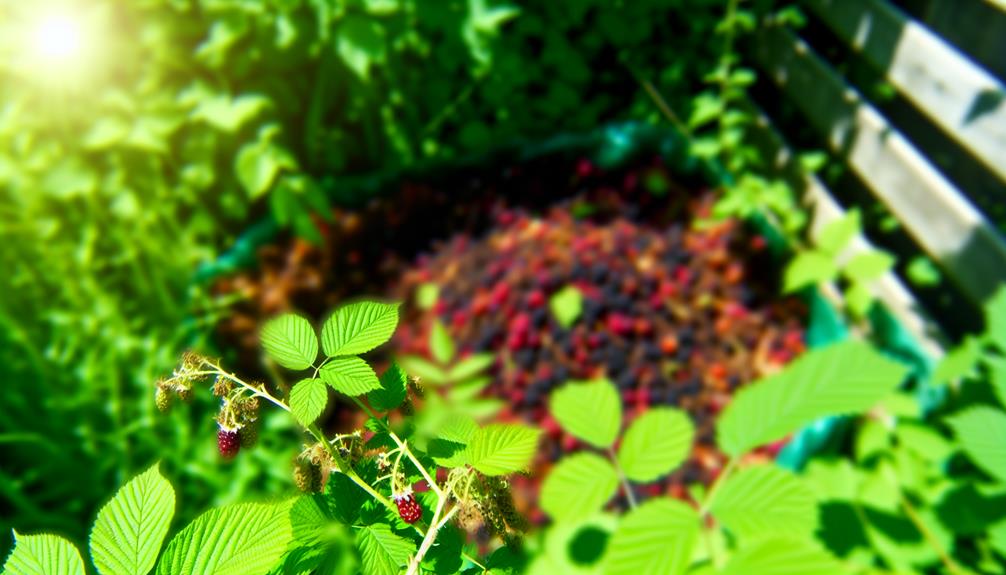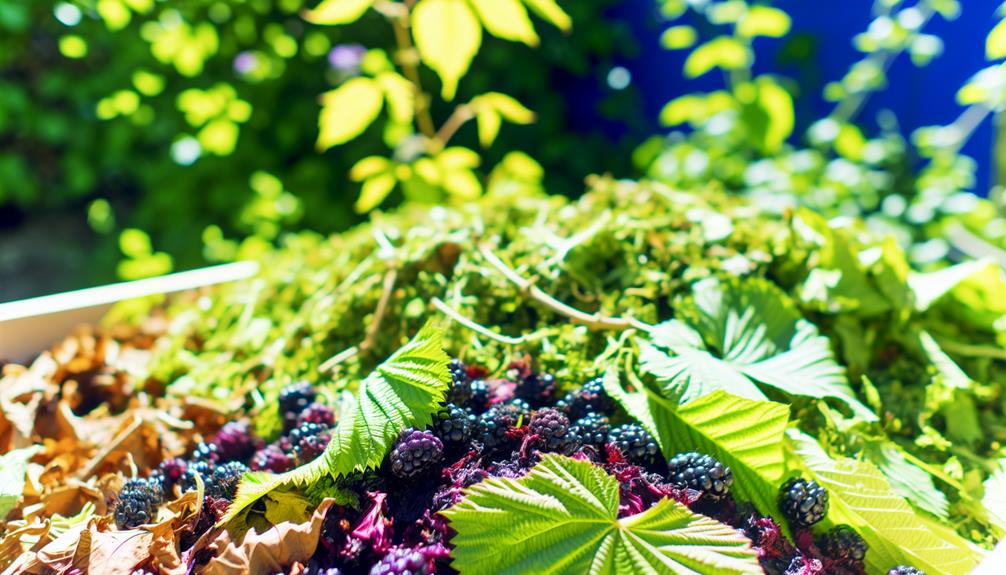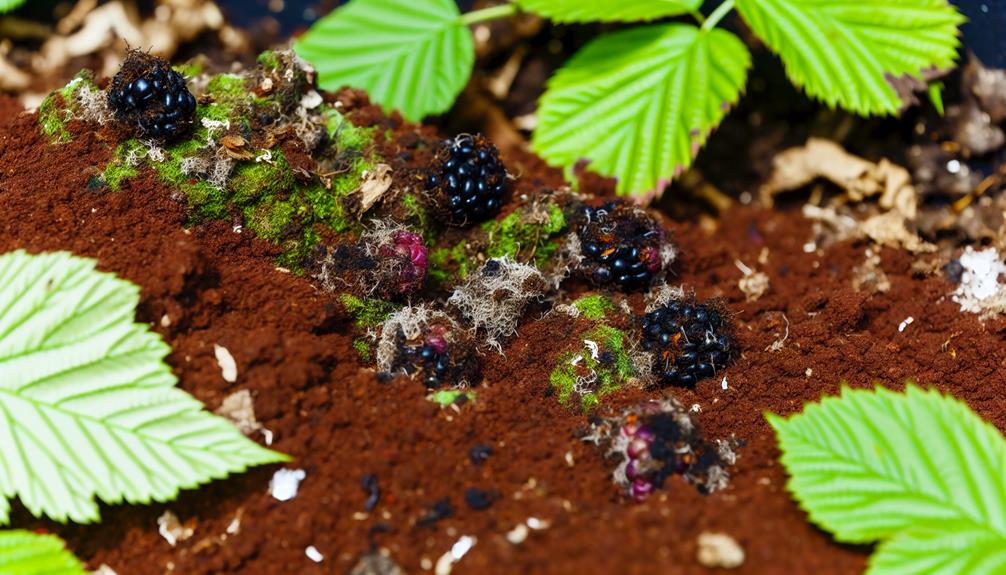

Yes, you can compost blackberry to enrich your soil with essential nutrients. Remove large stems and leaves, and optionally wash them to remove pesticides. Cutting them into smaller pieces will speed up decomposition. Blackberries are nutrient-rich, helping to boost microbial activity and improve soil structure. However, balance them with brown materials like leaves to avoid a soggy compost pile.
Be mindful of pests attracted by their sweet smell; bury them deeper in the pile to mitigate this. Regularly turning the compost will speed up the breakdown process. Keep going to discover tips for optimizing your composting efforts.
Composting blackberries enriches your soil with essential nutrients, promoting healthier plant growth. By including blackberries in your compost, you’re also contributing to environmental sustainability and waste reduction. Instead of tossing those overripe or spoiled blackberries into the trash, composting them helps reduce landfill waste and recycles valuable organic material back into your garden.
To get started, gather your blackberries and any other compostable kitchen scraps. You’ll want to create a balanced mix of green (nitrogen-rich) and brown (carbon-rich) materials. Blackberries fall into the green category, so pair them with materials like dried leaves, straw, or cardboard to maintain the right ratio. It’s important to chop larger items into smaller pieces to expedite the decomposition process.
Turn your compost pile regularly to ensure proper aeration and decomposition. This action helps break down the materials quicker and prevents unwanted odors. Remember to keep your compost moist, but not waterlogged, by occasionally sprinkling water if it becomes too dry.
Blackberries are rich in essential vitamins and minerals, making them a nutritious addition to your compost. You’ll find they contain significant amounts of Vitamin C, Vitamin K, and manganese.
Additionally, their antioxidant properties can help boost the overall health of your garden soil.
You’ll find blackberries are packed with essential vitamins and minerals that contribute to overall health. They offer significant dietary benefits, enhancing nutrient absorption and supporting various bodily functions.
Blackberries are rich in Vitamin C, which boosts your immune system, and Vitamin K, crucial for blood clotting and bone health. Additionally, they contain manganese, aiding in metabolism and calcium absorption, making them a powerhouse of nutrition.
Here’s a quick look at the key vitamins and minerals in blackberries:
| Vitamin/Mineral | Key Benefits |
|---|---|
| Vitamin C | Boosts immune function |
| Vitamin K | Supports blood clotting |
| Manganese | Enhances metabolism |
By including blackberries in your diet, you join a community focused on achieving excellent health through natural means. These berries offer more than just a sweet taste; they provide essential nutrients that your body needs to function effectively.
Incorporating blackberries into your meals can significantly improve nutrient absorption, ensuring you get the most out of your dietary intake. Their dietary benefits make them a must-have for anyone looking to enhance their overall wellness and belong to a health-conscious community.
Frequently underestimated, the antioxidant properties of blackberries play an essential role in protecting your body against oxidative stress and free radical damage. These tiny fruits are packed with powerful antioxidants that offer numerous health advantages. When you include blackberries in your diet, you’re giving your body a boost of essential nutrients that can help improve your overall well-being.
The antioxidant benefits of blackberries come from their high levels of vitamins C and E, as well as anthocyanins, which give them their deep purple color. These compounds work together to neutralize harmful free radicals in your body, reducing the risk of chronic diseases and supporting a healthy immune system.
Here’s why you should consider adding blackberries to your daily routine:
Also Read: Can You Compost Celery?
To prepare blackberries for composting, start by removing any large stems and leaves. This step guarantees that only the fruit, which breaks down more quickly, goes into your compost.
Washing blackberries is optional but can help remove any pesticides or chemicals, especially if they aren’t organic. If you choose to wash them, pat them dry with a clean cloth before moving on to the next step.
Next, focus on removing stems. While blackberry stems can decompose, they take longer than the fruit itself. By eliminating them, you’ll expedite the composting process and ensure a more uniform compost mix. Use a small knife or your hands to carefully separate the stems from the berries.
Once you’ve removed the stems and leaves, you can cut the blackberries into smaller pieces. This isn’t strictly necessary but can help the fruit break down even faster. Smaller pieces mean more surface area for microbes to work on, which accelerates decomposition.
When adding blackberries to your compost, you’ll benefit from their nutrient-rich organic material, which enhances the compost’s overall quality.
Be mindful that blackberries decompose at a moderate pace, so mix them well with other compost ingredients to guarantee even breakdown.
This process enriches your compost, leading to healthier soil and more robust plant growth.
Incorporating blackberries into your compost pile enriches the mixture with essential nutrients and organic matter. These berries break down easily, adding crucial elements like nitrogen and potassium to your compost.
When you mix blackberries into your pile, you’re creating an environment where organic breakdown occurs efficiently. But don’t forget about compost troubleshooting—monitor the balance of green (nitrogen-rich) and brown (carbon-rich) materials to make certain everything decomposes properly.
Adding blackberries offers several benefits:
Understanding the decomposition time frame for blackberries in your compost is key to managing the overall composting process effectively. Blackberries, like other organic materials, break down at different rates depending on various factors. Seasonal variations and climatic conditions play significant roles in how quickly these fruits decompose.
When you add blackberries to your compost, anticipate them to decompose within a few weeks to a couple of months. The process is influenced by temperature, moisture levels, and the presence of other organic materials. Here’s a breakdown to help you visualize:
| Climatic Condition | Decomposition Time Frame | Notes |
|---|---|---|
| Warm and Humid | 2-4 weeks | Rapid due to high microbial activity |
| Cool and Dry | 1-2 months | Slower due to reduced moisture and microbial activity |
| Seasonal Variation | Varies | Spring and summer accelerate, fall and winter slow down |
| Mixed Conditions | 3-6 weeks | Dependent on balance of heat and moisture |
To speed up the decomposition, make sure your compost pile remains moist but not waterlogged, and turn it regularly. By understanding these factors, you’ll maintain a well-balanced compost pile that decomposes efficiently, creating a sense of accomplishment and belonging in your composting community.
Adding blackberries to your compost enriches the soil with essential nutrients and organic matter, enhancing its overall health and fertility. When you incorporate blackberries, you introduce crucial elements like potassium, calcium, and vitamins, which support plant growth.
Additionally, the rich organic matter helps improve soil structure, making it easier for roots to penetrate and absorb nutrients.
By adding blackberries to your compost, you also boost soil biodiversity and microbial activity. The natural sugars and fibers in blackberries provide an excellent food source for beneficial microorganisms.
These microbes decompose organic matter, releasing nutrients back into the soil and creating a more vibrant, living environment.
Here’s how adding blackberries to your compost can positively impact your soil health:
Also Read: Can You Compost Basil?
To create a thriving compost pile, you need to balance green materials like fresh blackberries with brown materials like dried leaves. The key to successful composting lies in managing the carbon ratio and nitrogen balance.

Fresh blackberries fall into the ‘green’ category, rich in nitrogen, which helps microorganisms break down organic matter quickly. However, too much nitrogen can lead to a smelly, anaerobic pile.
To counterbalance the nitrogen, add brown materials like dried leaves, straw, or cardboard, which are high in carbon. The ideal carbon-to-nitrogen ratio is roughly 30:1. For every bucket of blackberries or other green materials, mix in about three buckets of brown materials. This blend maintains a balanced environment, promoting efficient decomposition without unpleasant odors.
Layering can also help maintain this balance. Start with a base layer of brown materials, add a layer of green materials, and then cover with another layer of brown. Continue this pattern to create a well-structured compost pile.
Turning the pile every few weeks will aerate it, speeding up the decomposition process. By following these guidelines, you’ll create a nutritious compost that benefits your garden and plants.
Also Read: Can You Compost Barbecue Sauce?
Composting blackberries can present unique challenges, such as their high moisture content and tendency to attract pests. You might also face issues with thorn management, which can make handling compost a bit tricky.
Here are some potential challenges you may encounter:
To address these challenges, make sure you add plenty of dry, brown materials to balance the moisture. Regularly turning your compost will help manage pests and odors. For thorn management, wearing thick gloves and using tools to handle the canes can keep you safe.
Also Read: Can You Compost Artichoke?
Dealing with moldy blackberries in your compost can be straightforward if you follow a few essential tips. First, it’s important to understand that fungal growth is a natural part of the composting process. However, if mold becomes excessive, it can disrupt the balance of your compost pile.

To manage moldy blackberries effectively, consider the following disposal methods:
| Issue | Solution |
|---|---|
| Excessive Mold | Mix in dry materials like straw or leaves |
| Unpleasant Odor | Turn the pile to increase aeration |
| Slow Decomposition | Add nitrogen-rich materials (e.g., grass clippings) |
| Attracting Pests | Bury the blackberries deeper in the pile |
| Uneven Breakdown | Chop blackberries into smaller pieces |
Mixing moldy blackberries with dry materials like straw or leaves can help absorb excess moisture, reducing mold. Turning the compost pile regularly increases aeration, which helps control fungal growth. Adding nitrogen-rich materials like grass clippings can speed up decomposition. Burying the moldy blackberries deeper in the pile can minimize pest attraction.
When you use compost enriched with blackberries, your garden benefits from a boost in nutrients and improved soil structure. The rich organic matter from blackberries can make your plants thrive, but you need to be mindful of a few things.
First, make sure your compost is well-balanced. Too many blackberries can lead to an overly acidic compost, causing issues for some plants. Regularly turn your compost pile to maintain proper aeration and decomposition. If you notice any compost troubleshooting, such as foul odors or slow decomposition, it might be due to an imbalance in your ingredients.
Blackberry pests can sometimes be a concern. Ensure any blackberries you add to your compost pile are pest-free to avoid spreading potential infestations. If you’re vigilant, you’ll reap the benefits of nutrient-rich compost without the drawbacks.
Consider the following benefits your garden will experience:
You can compost blackberry bushes and leaves. By incorporating proper pruning techniques, you’ll guarantee healthy growth. Composting them enriches the soil, creating a nurturing environment for your garden. Join the eco-friendly community and start composting today!
When composting blackberries, you’ll attract pests due to mold growth and odor issues. To minimize this, turn the compost regularly. You’re part of a community that cares about effective composting and keeping your space pest-free.
When considering the decomposition process, blackberries typically take a few weeks to a couple of months to fully break down. The organic breakdown is faster if you turn your compost regularly and maintain proper moisture levels.
Yes, blackberry seeds can sprout in compost. Their seed viability is high, and the germination rate is good if conditions are right. So, if you compost them, you might see new blackberry plants emerging.
You should avoid composting blackberries with pesticide residue. Instead, use organic alternatives to keep your compost safe and healthy. By doing so, you’ll maintain a thriving, eco-friendly community garden we can all enjoy.
Composting blackberries is straightforward and beneficial. Make sure you chop them up to speed decomposition.
Balance green materials like blackberries with brown materials such as leaves or straw. Be mindful of moldy fruit and mix it well to avoid issues.
The nutrient-rich compost you’ll get will boost your garden’s health. With these simple steps, you’ll effectively recycle blackberry waste and enrich your soil.
Follow these tips for a productive and environmentally friendly composting process.
